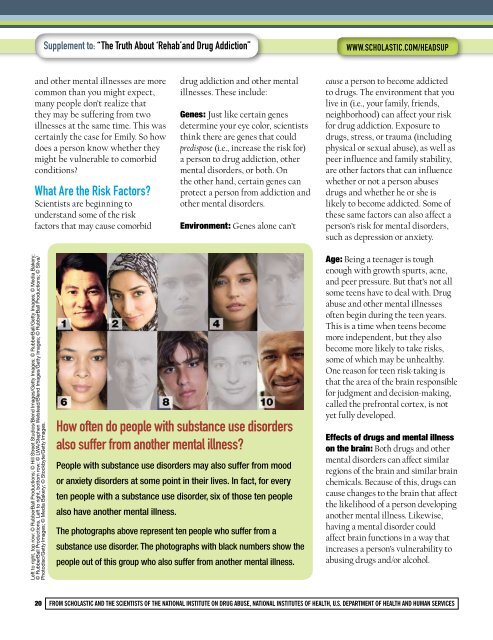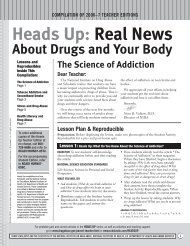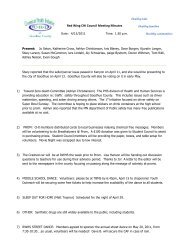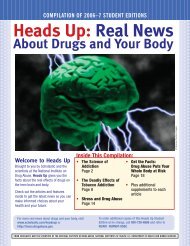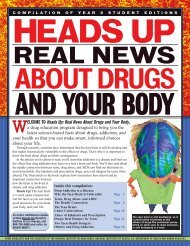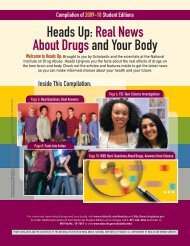Heads Up:Real News About Drugs and Your Body - Scholastic
Heads Up:Real News About Drugs and Your Body - Scholastic
Heads Up:Real News About Drugs and Your Body - Scholastic
You also want an ePaper? Increase the reach of your titles
YUMPU automatically turns print PDFs into web optimized ePapers that Google loves.
Supplement to: “The Truth <strong>About</strong> ‘Rehab’<strong>and</strong> Drug Addiction”<br />
www.scholastic.com/HEADSUP<br />
<strong>and</strong> other mental illnesses are more<br />
common than you might expect,<br />
many people don’t realize that<br />
they may be suffering from two<br />
illnesses at the same time. This was<br />
certainly the case for Emily. So how<br />
does a person know whether they<br />
might be vulnerable to comorbid<br />
conditions<br />
What Are the Risk Factors<br />
Scientists are beginning to<br />
underst<strong>and</strong> some of the risk<br />
factors that may cause comorbid<br />
drug addiction <strong>and</strong> other mental<br />
illnesses. These include:<br />
Genes: Just like certain genes<br />
determine your eye color, scientists<br />
think there are genes that could<br />
predispose (i.e., increase the risk for)<br />
a person to drug addiction, other<br />
mental disorders, or both. On<br />
the other h<strong>and</strong>, certain genes can<br />
protect a person from addiction <strong>and</strong><br />
other mental disorders.<br />
Environment: Genes alone can’t<br />
cause a person to become addicted<br />
to drugs. The environment that you<br />
live in (i.e., your family, friends,<br />
neighborhood) can affect your risk<br />
for drug addiction. Exposure to<br />
drugs, stress, or trauma (including<br />
physical or sexual abuse), as well as<br />
peer influence <strong>and</strong> family stability,<br />
are other factors that can influence<br />
whether or not a person abuses<br />
drugs <strong>and</strong> whether he or she is<br />
likely to become addicted. Some of<br />
these same factors can also affect a<br />
person’s risk for mental disorders,<br />
such as depression or anxiety.<br />
Left to right, top row: © RubberBall Productions; © Hill Street Studios/Blend Images/Getty Images; © RubberBall/Getty Images; © Media Bakery;<br />
© RubberBall Productions. Left to right, bottom row: © LWA/Stephen Welstead/Blend Images/Getty Images; © RubberBall Productions; © Silva/<br />
Photodisc/Getty Images; © Media Bakery; © Stockbyte/Getty Images.<br />
How often do people with substance use disorders<br />
also suffer from another mental illness<br />
People with substance use disorders may also suffer from mood<br />
or anxiety disorders at some point in their lives. In fact, for every<br />
ten people with a substance use disorder, six of those ten people<br />
also have another mental illness.<br />
The photographs above represent ten people who suffer from a<br />
substance use disorder. The photographs with black numbers show the<br />
people out of this group who also suffer from another mental illness.<br />
Age: Being a teenager is tough<br />
enough with growth spurts, acne,<br />
<strong>and</strong> peer pressure. But that’s not all<br />
some teens have to deal with. Drug<br />
abuse <strong>and</strong> other mental illnesses<br />
often begin during the teen years.<br />
This is a time when teens become<br />
more independent, but they also<br />
become more likely to take risks,<br />
some of which may be unhealthy.<br />
One reason for teen risk-taking is<br />
that the area of the brain responsible<br />
for judgment <strong>and</strong> decision-making,<br />
called the prefrontal cortex, is not<br />
yet fully developed.<br />
Effects of drugs <strong>and</strong> mental illness<br />
on the brain: Both drugs <strong>and</strong> other<br />
mental disorders can affect similar<br />
regions of the brain <strong>and</strong> similar brain<br />
chemicals. Because of this, drugs can<br />
cause changes to the brain that affect<br />
the likelihood of a person developing<br />
another mental illness. Likewise,<br />
having a mental disorder could<br />
affect brain functions in a way that<br />
increases a person’s vulnerability to<br />
abusing drugs <strong>and</strong>/or alcohol.<br />
20<br />
FROM SCHOLASTIC AND THE SCIENTISTS OF THE NATIONAL INSTITUTE ON DRUG ABUSE, NATIONAL INSTITUTES OF HEALTH, U.S. DEPARTMENT OF HEALTH AND HUMAN SERVICES


